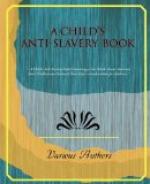Lewis had yet to learn that even the poor slave may with all his soul believe on Jesus, and no master on earth could hinder him. Mr. Stamford had never given his slaves any religious teachings, and perhaps it was just as well that he did not attempt anything of that kind, for he is said to have taught his white congregation that it was no more harm to separate a family of slaves than a litter of pigs. His new master, whose name was Johns, lived about thirty miles distant, and nearly as much as that nearer the boundary line between Ohio and Kentucky, an item which the boy noticed with much satisfaction. On their way home Mr. Johns took special pains to impress on the mind of his new property the fact, that the condition of his being well treated in his new home would be his good behavior. “It’s of no use,” he says, “for my boys to go to showing off airs, and setting themselves up. I can’t stand that. But if they are quiet and industrious, I give them as good allowances and as good quarters as anybody.”
What Mr. Johns called good behavior in servants, was their doing promptly and precisely just as he told them to, without venturing to think for themselves anything about it. If any of them did venture an opinion before him he shut them up with a cut of the whip or a sharp word, so that the utmost extent of their conversation in his presence was a strict answer to his questions, and “Yes, massa,” in reply to his commands.
Lewis was destined to assist in the garden. Mr. Johns was very fond of horticulture, but to have had his head gardener a slave, would have involved the necessity of talking with him, and consulting him too much to consist with his views of propriety. The slaves of families in the far South are not usually treated in this manner, but Mr. Johns was by birth an Englishman. The gardener, then, was a free white man named Spencer, and Lewis found him a very pleasant master. It was not difficult for him to find his way into his good graces, so that Lewis did not suffer so much by the change as he expected. His heart was already hardened by the loss of so many friends, that he took this with unexpected indifference. But he did miss his brother Ned. More than once, in his dreams, did he hear him crying for help; but after a while he heard, through a fellow-slave, that Ned was serving as waiter in a hotel at Louisville. This was the last he ever heard of him.
Besides this, Lewis loved his new work. It was so delightful to see the shrubs, and trees, and plants flourish, and the flowers putting forth their gorgeous displays; and Spencer’s kindness made the heaviest work seem light. It is very easy to serve a man that governs by kindness, but Lewis thought it would be much harder to serve Spencer if he had felt that he was his owner.




